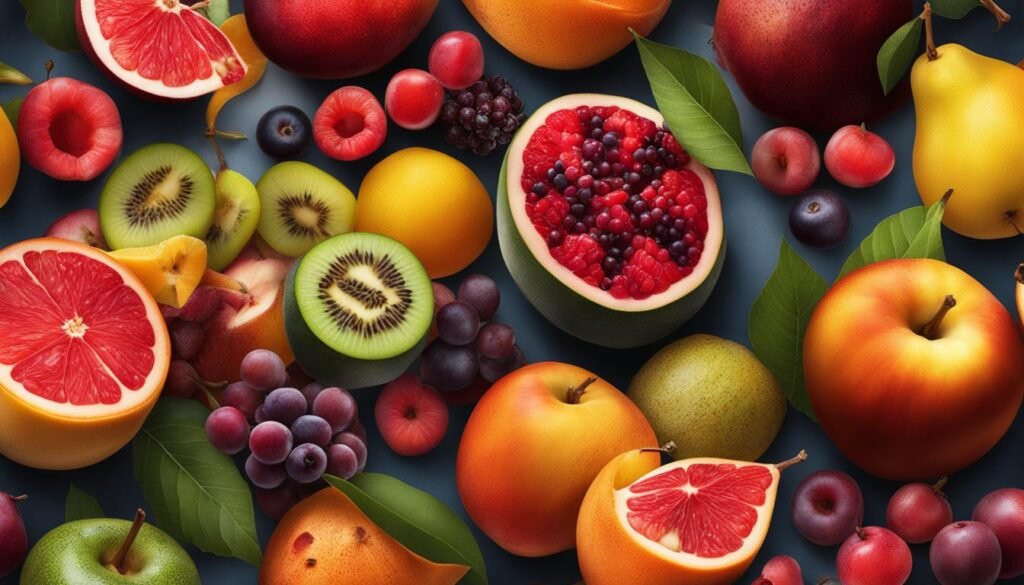Winter fruits offer a plethora of benefits that can enhance both our physical and mental well-being during the colder months. From boosting our immune system to providing essential nutrients, winter fruits are nature’s gift to us. In this article, we will explore the surprising health benefits of winter fruits and learn how to incorporate them into our daily diet for maximum benefit.
Key Takeaways:
- Winter fruits provide a range of health benefits to support our well-being in the colder months.
- Incorporating winter fruits into our diet can boost our immune system and promote overall health.
- Understanding the nutritional value of winter fruits can help us make more informed choices in our daily diet.
- Eating seasonally and supporting local farmers can have a positive impact on our health and the environment.
- By exploring the various ways to enjoy winter fruits, we can make our meals more nutritious and enjoyable.
Unlocking the Surprising Health Benefits of Winter Fruits
Winter fruits are not only delicious but also packed with health benefits. These fruits are rich in vitamins, minerals, and antioxidants that can boost our immune system, improve heart health, promote healthy digestion, and even reduce the risk of chronic diseases. Let’s unlock the secrets of these amazing fruits and discover their potential for enhancing our overall health.
Winter fruits offer a natural way to elevate our well-being during the colder months. They are a great source of essential nutrients that our body needs to function optimally. From vitamin C in citrus fruits like oranges and grapefruits to potassium in bananas and oranges, winter fruits provide a wide array of vitamins and minerals that contribute to our overall health.
In addition to their nutrient content, winter fruits are also rich in antioxidants. These powerful compounds protect our cells from damage caused by harmful free radicals and reduce the risk of chronic diseases, such as heart disease and certain types of cancer. Berries, including blueberries and cranberries, are particularly high in antioxidants and are a delicious and nutritious option to include in our winter fruit selection.
Furthermore, winter fruits are known for their high fiber content, which aids in digestion and supports a healthy gut. Fiber promotes regular bowel movements, prevents constipation, and helps control blood sugar levels. Fruits like apples and pears are excellent sources of dietary fiber and make a satisfying and wholesome snack option.
To truly understand and appreciate the health benefits of winter fruits, it is important to incorporate them into our daily diet. Whether consumed fresh, added to smoothies, or incorporated into recipes, winter fruits can provide a burst of flavor and nutrition to our meals.
Unlocking the Benefits
- Boost the immune system with vitamin C
- Promote heart health with antioxidants
- Enhance digestion with fiber
- Reduce the risk of chronic diseases
By including a variety of winter fruits in our diet, we can unlock the full potential of their health benefits and enjoy good health throughout the winter season.
“Winter fruits are like nature’s medicine cabinet, providing us with the essential nutrients we need to thrive during the colder months.”
The Essential Nutrients in Winter Fruits for Good Health
Winter fruits are an excellent source of essential nutrients that are crucial for maintaining good health. They are particularly rich in vitamins, antioxidants, and minerals that support our immune system, promote healthy aging, and ensure proper functioning of our body. In this section, we will explore the vitamins responsible for a strong immune system, the role of antioxidants in slowing down the aging process, and the importance of minerals in maintaining optimal body functions.
Vitamins Responsible for a Strong Immune System
Winter fruits are abundant in vitamins that play a crucial role in strengthening our immune system. Vitamin C, found in citrus fruits like oranges and grapefruits, boosts the production of white blood cells, which are essential for fighting off infections. Vitamin A, commonly found in fruits like pomegranates and kiwis, helps in maintaining the integrity of our skin and mucous membranes, acting as a protective barrier against pathogens.
Antioxidants in Fruits: The Secret to Aging Gracefully
Antioxidants are compounds found in various winter fruits that help protect our cells from damage caused by free radicals. Berries, such as blueberries and cranberries, are known for their high antioxidant content. These powerful antioxidants can neutralize free radicals and reduce the risk of chronic diseases, including heart disease and certain types of cancer.
Minerals That Help to Maintain Your Body Functions
Winter fruits are also rich in minerals that are essential for maintaining various body functions. Potassium, found in fruits like bananas and oranges, helps regulate blood pressure and maintain proper heart function. Calcium, present in fruits like figs and oranges, is important for strong bones and teeth. By incorporating these mineral-rich fruits into our diet, we can ensure our body functions optimally.
Winter Fruits are Full of Benefits
Winter fruits offer a multitude of benefits that can enhance our overall health and well-being. These fruits are not only delicious but also packed with essential vitamins, minerals, and antioxidants. By incorporating winter fruits into our diet, we can reap numerous advantages, including improved digestion, enhanced immune function, and support for healthy aging.
One of the key benefits of winter fruits is their high nutritional value. They are rich in vitamins and minerals that are essential for our body’s optimal functioning. These nutrients can help strengthen our immune system, promote healthy digestion, and support overall wellness.
In addition, winter fruits are a great source of antioxidants, which play a vital role in protecting our cells from damage caused by free radicals. These antioxidants can help reduce the risk of chronic diseases and support our overall health and well-being.
Furthermore, the fiber content in winter fruits can aid in digestion and promote a healthy gut. Fiber helps regulate bowel movements, prevents constipation, and supports a healthy weight.
The benefits of winter fruits extend beyond physical health. These fruits can also contribute to healthy aging, thanks to their antioxidant properties. Antioxidants help protect our cells from oxidative stress, which can lead to premature aging and various age-related diseases.
Incorporating winter fruits into our daily diet can be as simple as enjoying them as a snack, adding them to salads or smoothies, or using them in various recipes. By embracing the benefits of winter fruits, we can nurture our bodies and enjoy the delicious flavors and nutritional value they offer.
Seasonal Winter Fruits: Nature’s Cold Weather Gift

Seasonal winter fruits are a true gift of nature during the cold months. Eating seasonally not only benefits our health but also has a positive impact on the environment. In this section, we will explore why eating seasonally is beneficial for our health and the environment. We will also highlight the abundance of citrus fruits, which are rich in vitamin C, and the nutritive power of underground winter fruits like sweet potatoes and beets.
Why Eating Seasonally Benefits Your Health and The Environment
Eating seasonally means consuming fruits that naturally grow during the winter months. These fruits are harvested at their peak freshness, ensuring maximum flavor and nutrient content. Eating seasonally also supports local farmers and reduces the carbon footprint associated with transporting fruits from distant locations. By embracing the seasonality of winter fruits, we can align our diet with nature and reap the benefits of fresh, locally sourced produce.
Citrus Galore: A Bounty of Vitamin C During Cold Months
Citrus fruits like oranges, grapefruits, and lemons are in abundance during the winter months. These fruits are a rich source of vitamin C, which is essential for a healthy immune system. Vitamin C acts as an antioxidant, helps in collagen production, and aids in the absorption of iron. Including citrus fruits in our diet can strengthen our immune system, prevent common colds and flu, and promote overall well-being.
Rooted in Sweetness: The Nutritive Power of Underground Winter Fruits
Underground winter fruits, such as sweet potatoes, beets, and carrots, are packed with nutrients and offer a natural sweetness. These root vegetables are high in fiber, vitamins, and minerals. They provide essential nutrients like vitamin A, beta-carotene, and potassium, which promote healthy vision, support brain function, and maintain proper heart health. Incorporating these underground winter fruits into our diet can offer a range of health benefits while adding variety and flavor to our meals.
Bolstering Your Diet with the Best Winter Fruits for Health
To truly harness the health benefits of winter fruits, it’s important to know which fruits to include in our diet. In this section, we will explore some of the best winter fruits for optimal health. Let’s delve into the nutritional value and unique benefits of each fruit.
Apples
Apples are not only a popular winter fruit but also a nutritious powerhouse. They are rich in dietary fiber, which aids in digestion and promotes a feeling of fullness. Apples contain antioxidants and vitamin C, which contribute to a healthy immune system. Regular consumption of apples can support weight management, improve heart health, and enhance overall well-being.
Pomegranates
Pomegranates are often referred to as “jewels” due to their vibrant color and rich nutritional value. They are packed with antioxidants and polyphenols, which have been shown to improve heart health by reducing inflammation and lowering blood pressure. Pomegranates are also a good source of vitamin C and fiber. Adding this delicious fruit to our diet can promote cardiovascular health and provide a boost of essential nutrients.
Kiwis
Kiwis are small fruits that pack a punch when it comes to nutrition. They are rich in vitamin C, vitamin E, and fiber. Vitamin E is an antioxidant that helps protect our cells from damage. Kiwis also contain enzymes that aid in digestion and contribute to a healthy gut. Including kiwis in our diet can boost our immune system, support healthy digestion, and provide a dose of essential nutrients.
Persimmons
Persimmons are exotic fruits with a sweet and delicate flavor. They are believed to have warming properties and are often consumed during the winter season to combat cold weather. Persimmons are a rich source of antioxidants, vitamins, and minerals, making them a beneficial addition to our winter diet.
By incorporating these best winter fruits into our diet, we can enjoy their delicious flavors while reaping their numerous health benefits.
Popular Winter Fruits Benefits: Beyond Being Just Delicious

Winter fruits not only taste delicious but also offer a range of health benefits. In this section, we will focus on three popular winter fruits – apples, pomegranates, and kiwis – and explore their unique benefits for our health.
Apples: Crunchy Treats Rich in Fiber
Apples are a versatile and widely consumed fruit during the winter season. They are a great source of dietary fiber, which aids in digestion and promotes a feeling of fullness. Apples also contain antioxidants and vitamin C, which contribute to a healthy immune system. Regular consumption of apples can support weight management, improve heart health, and enhance overall well-being.
Pomegranates: Jewels Packed with Heart-Healthy Compounds
Pomegranates are known as “jewels” due to their vibrant color and rich nutritional value. They are packed with antioxidants and polyphenols, which have been shown to improve heart health by reducing inflammation and lowering blood pressure. Pomegranates are also a good source of vitamin C and fiber. Adding this delicious fruit to our diet can promote cardiovascular health and provide a boost of essential nutrients.
Kiwis: Small Fruits with Big Vitamin E Content
Kiwis are small fruits that pack a punch when it comes to nutrition. They are rich in vitamin C, vitamin E, and fiber. Vitamin E is an antioxidant that helps protect our cells from damage. Kiwis also contain enzymes that aid in digestion and contribute to a healthy gut. Including kiwis in our diet can boost our immune system, support healthy digestion, and provide a dose of essential nutrients.
These popular winter fruits not only add flavor and variety to our meals but also offer a range of health benefits. From fiber-rich apples to heart-healthy pomegranates and vitamin E-packed kiwis, including these fruits in our diet can enhance our overall well-being during the winter season.
Warm Up from Inside Out: Winter Fruits That Boost Your Internal Heat
Winter fruits not only provide essential nutrients but can also help warm us up from the inside out. In this section, we will explore some winter fruits that have warming properties and can raise our body temperature during the colder months.
Spicy Fruits That Raise Your Body Temperature
Some winter fruits have natural compounds that can raise our body temperature and provide a warming effect. Fruits like ginger and cinnamon have thermogenic properties and can increase our metabolic rate, helping us generate more internal heat. Incorporating these spicy fruits into our diet can provide a natural way to stay warm and cozy during the winter season.
Sweet Potatoes and Yams: Fueling Your Body with Comfort
Sweet potatoes and yams are root vegetables that are not only comforting but also help raise our body temperature. They are rich in carbohydrates, which provide energy and promote the production of heat in our body. Sweet potatoes and yams are also packed with vitamins, minerals, and fiber, making them a nutritious and filling addition to our winter menu.
Persimmons: Exotic Fruits with Warming Properties
Persimmons are exotic fruits that are known for their sweet and delicate flavor. They are believed to have warming properties and are often consumed during the winter season to combat cold weather. Persimmons are a rich source of antioxidants, vitamins, and minerals, making them a beneficial addition to our winter diet.
The Healing Powers of Winter Fruits: Remedies Hidden in Plain Sight
Winter fruits not only nourish our bodies but also offer natural remedies for common winter ailments. In this section, we will explore how certain winter fruits can help combat seasonal affective disorder, ease winter colds and flu, and act as natural cough suppressants.
Combating Seasonal Affective Disorder with Mood-Boosting Fruits
Seasonal affective disorder (SAD) is a type of depression that occurs during the winter months. Some winter fruits, such as citrus fruits and berries, contain mood-boosting compounds that can help alleviate the symptoms of SAD. These fruits are rich in vitamin C and antioxidants, which contribute to improved mood and mental well-being.
How Certain Fruits Can Ease Winter Colds and Flu
Winter fruits are not only rich in immune-boosting nutrients but also contain compounds that can ease the symptoms of winter colds and flu. Fruits like oranges, pineapples, and berries are packed with vitamin C and antioxidants, which can help reduce the severity and duration of colds and flu. Including these fruits in our diet can support our immune system and aid in a quicker recovery.
Fruits as Natural Cough Suppressants: Quenching Winter Throats
Winter is often accompanied by pesky coughs and sore throats. Some winter fruits, such as honeydew melons and pears, have soothing properties that can help relieve coughs and soothe irritated throats. These fruits are high in water content and contain compounds that promote hydration and provide relief from cough symptoms.
Conclusion
Winter fruits are a powerhouse of nutrients, offering a wide range of benefits for our health and well-being. By incorporating seasonal winter fruits into our daily diet, we can strengthen our immune system, support heart health, improve digestion, and much more. Enjoying the delicious and nutritious fruits that the winter season has to offer can truly enhance our overall health.
To maximize the benefit of winter fruits, it is crucial to integrate them into our daily routine. Whether it’s adding them to smoothies, salads, desserts, or enjoying them as a snack, there are numerous ways to incorporate winter fruits into our meals. Exploring different recipes and experimenting with the versatility of these fruits can make our dishes more nutritious and enjoyable.
In addition to the health benefits, choosing to consume seasonal winter fruits also has a positive impact on the environment. By supporting local farmers and opting for locally grown produce, we reduce the carbon footprint associated with importing fruits from distant locations. This choice promotes sustainable agricultural practices and contributes to a healthier planet for future generations.
FAQ
What are the benefits of winter fruits?
Winter fruits offer a plethora of benefits, including boosting the immune system, providing essential nutrients, improving heart health, promoting healthy digestion, and reducing the risk of chronic diseases.
What nutrients do winter fruits contain?
Winter fruits are rich in vitamins, minerals, and antioxidants. They contain vitamins C and A, antioxidants that protect against cell damage, and minerals like potassium and calcium that support various body functions.
Why should I eat seasonal winter fruits?
Eating seasonal winter fruits ensures maximum freshness and nutrient content. It also supports local farmers and reduces the carbon footprint associated with transporting fruits from distant locations.
Which winter fruits are best for optimal health?
Some of the best winter fruits for optimal health include apples, pomegranates, kiwis, and persimmons. Each fruit offers unique nutritional benefits, such as fiber, heart-healthy compounds, and vitamins.
What are the unique benefits of apples, pomegranates, and kiwis?
Apples are rich in fiber and antioxidants, promoting digestion and a healthy immune system. Pomegranates provide heart-healthy compounds, antioxidants, and fiber. Kiwis are high in vitamin C, vitamin E, and support digestion.
Are there winter fruits that can help raise my body temperature?
Yes, some winter fruits have warming properties, such as spicy fruits like ginger and cinnamon, sweet potatoes and yams, and exotic fruits like persimmons. These fruits can help raise your internal body temperature naturally.
Can winter fruits provide remedies for common winter ailments?
Absolutely! Certain winter fruits can combat Seasonal Affective Disorder (SAD), ease winter colds and flu, and act as natural cough suppressants. Citrus fruits and berries are mood-boosting, while oranges, pineapples, honeydew melons, and pears contain compounds that support the immune system and provide relief from cough symptoms.
How can I integrate winter fruits into my daily routine?
You can incorporate winter fruits into your daily routine by adding them to smoothies, salads, desserts, or enjoying them as snacks. The versatility of winter fruits allows for experimental and nutritious meal variations.
What is the impact of supporting winter crop production?
By choosing to consume seasonal winter fruits, you support local farmers and reduce the carbon footprint associated with importing fruits from distant locations. This choice promotes sustainable agricultural practices and helps preserve the environment for future generations.




